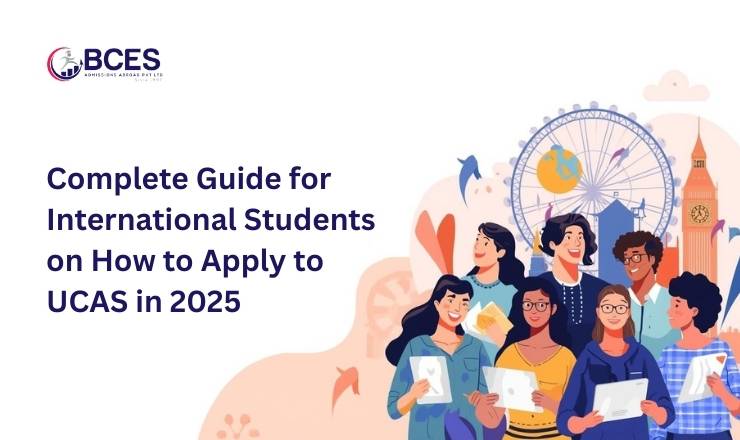Complete Guide for International Students on How to Apply to UCAS in 2025

23 September 2025
Planning to study in the UK is an exciting challenge, but the UCAS application process can be daunting. UCAS (Universities and Colleges Admissions Service) is the single application platform for all UK undergraduate students, and it allows you to manage applications to multiple universities through one portal which makes the application process much easier.
At BCES Admissions Abroad, we guide students through each phase of the UCAS application process. We want to ensure you make a strong application on time, steer clear of pitfalls, and gain your choice course. There will be improvements in the 2025 UCAS cycle, such as enhancements to the online platform’s tracking functionality and clarity around submission dates to minimize disruption to students. This guide has simplified everything into steps to enable an easy and trouble-free process.
Step 1: Research Courses and Universities
Prior to registering for a UCAS account, invest this time researching your courses and universities of interest. UCAS has a course search function, which will provide information about entry requirements, tuition fee levels and student life considerations – assist you to narrow your options to courses that match your skills and interests or career goals. International students often pursue popular academic directions such as Business, Engineering, Computer Science, Healthcare, etc. Planning ahead of time is the best approach if you are thinking of studying in the UK and ultimately selecting a course that aligns with your goals.
Step 2: Register on the UCAS Hub
The second step is to register on the UCAS Hub. Registration is free and allows access to tools to save courses, monitor progress, and begin your application. UCAS permits applications to a maximum of five courses, and getting your profile right is crucial, as universities will be checking against this information to authenticate your documents.
Step 3: Complete Your Application Form
Your UCAS application consists of a number of sections you must fill in carefully:
- Personal Information: Give information exactly as it is written on your passport.
- Education History: Give relevant details of your qualifications eg. 10th, 12th education or equivalent.
- Work Experience: State internships or positions that are relevant to your future plans.
- Course Choices: Give your first choice programs. Please note that Oxford and Cambridge only allow you to provide one choice program each.
Step 4: Write a Personal Statement that Stands Out
Use your personal statement to get noticed. Explain why you want to study in the UK, why you are interested in the subject you are choosing, and why your background has led you to your interest. Describe your strengths, achievements and goals in your career. A strong personal statement can be the decisional factor, it can also help you stand out from the other candidates.
Step 5: Obtain References
Each application must have at least one academic reference. This must be a teacher, lecturer, or mentor who knows your skills and achievements. Ask your reference well ahead of time to provide them with an opportunity to write a thorough recommendation.
Step 6: Pay the UCAS Application Fee
For 2025, the fee for multiple courses is £27.50 and for one course is £22.50. Payment is also done online, making it easy for international students to finish their applications securely.
Step 7: Adhere to the Application Deadlines
Deadlines are crucial to ensure your application is processed:
- 15 October 2024: Oxford, Cambridge, and Medicine, Dentistry, and Veterinary Medicine courses.
- 29 January 2025: Most of the other undergraduate courses.
Applying early will boost your prospects of receiving offers and scholarships.
Step 8: Track Your Application
Upon submission, make use of UCAS Track to keep track of your application. Universities reply with conditional or unconditional offers, which you can consider before making a choice. Checking regularly for updates helps you avoid missing vital communications.
Step 9: Respond to Offers
Once offers are made available to you, make a “firm choice” offer as your first option and an “insurance choice” offer as a standby. Clearly examine the terms that come with every offer prior to finalizing your choice.
Step 10: Prepare for Student Visa
After accepting an offer, international students will need a Student Route visa to study in the UK. Your university provides a Confirmation of Acceptance for Studies (CAS), which is required for your visa application. Starting the visa process early helps avoid delays before your course begins.
If you plan to study in the UK in 2025, the most logical step is to begin your UCAS application as early as possible. With sufficient plan and support from BCES Admissions Abroad you will give yourself the best chance of being a student at a great UK University and starting your studies off on the right foot.
Frequently Asked Questions (FAQs)
You are allowed to apply for five courses; however, Oxbridge (Oxford and Cambridge) counts as one option.
- 15 October 2024: Medicine, Vetmed, Dentistry, Oxford, Cambridge
- 29 January 2025: Most other courses
No, UCAS is for undergraduate applications only. Postgraduate courses are applied directly to universities.
It is very important; a good personal statement shows motivation, interest, and appropriateness for your course choice.
Yes, almost all universities require an IELTS, TOEFL, or other evidence of proficiency in English unless you qualify for exemption.
Yes, UCAS Track can monitor any changes, offers, and deadlines in your application.
You can apply again through UCAS Extra or through clearing but your options may be reduced.